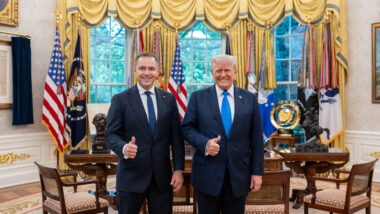Google und Verizon haben heute ihren Deal präsentiert, wie die beiden Unternehmen sich Netzneutralität vorstellen, bzw. wie man eine starke Netzneutralität irgendwie umgehen kann: A joint policy proposal for an open Internet. Die Kurzzusammenfassung ist: Das alte Internet bleibt – zumindest über Kabel und explizit nicht mobil – irgendwie offen, aber man plant einfach ein Neues, was dann einem Kabelfernsehennetz 2.0 vergleichbar sein wird.
Interessant ist die Einschätzung von Susan Crawford, die in ihrem Blog beschreibt, wie Google und Verizon versuchen, sich mit der Abmachung strengen Regeln zu entziehen, die juristisch einklagbar seien und vollendete Tatsachen zu präsentieren.
The key tradeoff being made here is between the treatment of wireless services, on the one hand, and the treatment of nondiscrimination, on the other. Google gave on wireless, and so there’s no policy suggestion for wireless net neutrality that has been provided by the companies. That’s a huge hole, given the growing popularity of wireless services and the recent suggestion by the Commission that we may not have a competitive wireless marketplace. Verizon gave on nondiscrimination, and so there is a suggestion that paid prioritization of services over the Internet would be presumed unlawful (something that AT&T would not have agreed to).
Das Post-Tech-Blog der Washington Post war bei der Telefonkonferenz der beiden Unternehmen dabei und hat mitgeschrieben: Google, Verizon CEOs announce pact for no wireless net neutrality rules, some paid prioritization.
In short: What you’ve read about so far about the deal is true:
1) No net neutrality rules for mobile networks, except for a „transparency“ requirement that makes public how traffic is managed.
2) A green light on „managed services“ that would allow for special priority for some content on other parts of the pipe, but not the public Internet.This is not going to be a popular announcement among advocates of net neutrality, particularly public interest groups. Google said it doesn’t want to play in the sandbox of managed service. „We like the public Internet,“ Schmidt said in the call. But some say this will give an unfair advantage to companies that are able to pay for priority access (imagine a Netflix channel on FiOs offered at better quality).
Kritik kommt bereits von den Bürgerrechts- und Verbraucherschutzorganisationen. Am stärksten wird kritisiert, dass Mautstrassen zwischen den Zeilen möglich gemacht werden und der Deal nicht für mobiles Internet gilt. Bei letzterem soll der Kunde nur transparent darüber informiert werden, was alles geblockt und/oder gedrosselt wird. Vor allem setzt man wohl darauf, ein neues, dem Kabelnetz vergleichbares Internet zu bauen. Was nicht mehr das offene Internet sein wird, was Google uns verkaufen will.
Public Knowledge kommentiert: Verizon-Google Agreement is „Nothing More than A Private Agreement between Two Corporate Behemoths.“
Most critically, it sacrifices the future of the mobile wireless Internet as this platform becomes more central to the lives of all Americans. „Under the Google-Verizon definition of network neutrality, wireless companies would only have to be transparent about their network practices – meaning that they could block any application, content or service so long as they told consumers they were doing so. And while there would be no pay for priority on the best efforts Internet, there are almost no limits on so-called “managed services,” other than that they would need to be “distinguishable in purpose and scope,” from the Internet. Thus, it is conceivable under the agreement that a network provider could devote 90% of its broadband capacity to these priority services and 10% to the best efforts Internet.
Scharfe Kritik kommt von Free Press, die seit Jahren die „Save the internet“-Kampagne pro Netzneutralität betreiben: Free Press Urges Policymakers to Reject Google-Verizon Pact.
„Google and Verizon can try all they want to disguise this deal as a reasonable path forward, but the simple fact is this framework, if embraced by Congress and the Federal Communications Commission, would transform the free and open Internet into a closed platform like cable television. This is much worse than a business arrangement between two companies. It’s a signed-sealed-and-delivered policy framework with giant loopholes that blesses the carving up of the Internet for a few deep-pocketed Internet companies and carriers. „If codified, this arrangement will lead to toll booths on the information superhighway. It will lead to outright blocking of applications and content on increasingly popular wireless platforms. It would give companies like Verizon, Comcast and AT&T the right to decide which content will move fast and which should be slowed down. And it will destroy the open Internet as a platform for small business innovation and job creation, cementing companies‘, like Google’s, dominant market power online.
Adam Green, Co-founder des Progressive Change Campaign Committee kommentiert auf Huffington Post: BREAKING: Google goes „evil“ Er fasst dort auch die wichtigsten Punkte nochmal zusammen:
The Google/Verizon deal (also posted online) basically says:
* The old „wireline“ Internet that will be irrelevant in a few years? We propose a „new, enforceable prohibition against discriminatory practices“ on that.
* New „wireless services“ (aka the entire future of the Internet)? No equivalent nondiscrimination rules for that, but we’ll „create enforceable transparency rules.“ That way, as Americans lose access to the free and open Internet, they can visibly watch it go away.
* Just in case „wireless services“ doesn’t encompass the entire future of the Internet, a new class of „new services“ is envisioned, which Schmidt and Seidenberg actively differentiated from „the public Internet.“ Basically, through private contracting, big corporations could deal directly with the Verizons and AT&Ts of the world to create the next YouTube, maybe dangle it without discrimination to the public just long enough for us to be hooked, and then discriminate like hell over it. But don’t worry, the FCC will „monitor the development of these services.“Google, a company that I’ve long admired and currently hold thousands of dollars of stock in, just „went evil.“ [….]
So, they cut a deal with the bad guys. And they’re now asking the public to accept two Internet experiences — a great experience for the old Internet that will soon cease to exist, and an experience filled with discrimination and lack of a level playing field for the entire future of the Internet. This is a moment for good people to stand up and be counted.
Treffend ist auch der Kommentar von Dan Gillmor auf Slate: Google-Verizon plan: Why you should worry.
So Google and Verizon had not, in fact, cooked up a special business deal for their mutual benefit. But what they have cooked up, as announced today, may be no great deal for you and me: the idea of a parallel network that could, in the long run, become the default network — at the very least for entertainment and truly advanced services.[….] Instead, the game is on to create a parallel Internet. It’ll still be packet-switched. But they won’t call it the Internet anymore. That’s an end game we should not encourage.
Wired: Google, Verizon Propose Open vs Paid Internets.
In other words, to avoid creating tiered access on the internet and dealing with associated governmental red tape, Google and Verizon have proposed creating a second, paid-access-only internet. Won’t ISPs such as Verizon have an incentive to develop the paid internet while leaving the “open” internet behind? Schmidt said that in addition to the FCC monitoring the situation under their proposal, Verizon will be incapable of ever prioritizing paid traffic over open internet traffic.[….] But if Google’s and Verizon’s proposal goes through, we really would have two internets — one free, where Google pledges to stay, another paid, where services such as 3D television, remote medical procedures, and bandwidth-intensive games appear — for a price.




also ich glaub nicht das google jetzt evil wird.
lass doch die netzbetreiber nen euro mehr für youtube kassieren. flat wirds immer geben und bald auch wlan oder ähnliches an den meisten orten und da gilt dann ja wieder netzneutralitaet für die google übrigens vehement kämpft.
locker bleiben!
@mrschtief
Es handelt sich ja nicht nur um einen Euro von Google wegen Youtube für die armen „Dump pipe“-Provider.
Entscheidend ist
– dass Unternehmen meinen über Netzneutralität entscheiden zu können
– dass das Mobile Web plötzlich was anderes ist als das Festnetz-Web, und da muss nichts datenpaket-neutral bleiben
– dass du tatsächlich glaubst, wenn google oder andere content-provider zahlen müssen, dass das nicht auf den Nutzer zurück fällt
– dass damit Markteintrittbarrieren geschaffen werden durch zusätzliche Kosten
oder wolltest du einfach irgendwie nen Witz machen, den ich nicht verstanden habe?
Gäbe es vernünftigen Wettbewerb zwischen den Providern, dann würde das Problem in der Form gar nicht bestehen.
Irgendwie ironisch (wenn auch leider unvermeidlich), dass jetzt der Staat eingreifen muss, um monopolistische Strukturen zu regulieren, bei denen er selbst durch Subventionen und Ähnliches mitgeholfen hat, sie zu erschaffen.
Es gibt genügend Alternativen zu Google und Verizon. Ob neue Geschäftsmodelle ankommen oder nicht, bestimmt immer noch der Kunde. Allerdings, da muss ich gleich hinterher schicken – der Kunde ist nicht immer rational :-(
Mal abseits der politischen Aspekte:
In den frühen Tagen gab es diverse verschiedene Netze unterschiedlicher Betreiber (ARPAnet, EUnet u.v.a.). Das Internet war sozusagen der Oberbegriff, der Zusammenschluss dieser Netze.
In der hier beschriebenen Entwicklung würde dies dann ja eigentlich umgekehrt: Nun wäre das Internet nur noch „ein Netz“, und das Google/Verizon-Netz ein weiteres.
Oder wäre das Google/Verizon-Netz dann ein weiteres Netz, das Teil des Internets ist? Und sich „nur“ nicht an die Netzneutralität hält?
Für mich sieht das ganze wie eine Wette aus: Google und Verizon setzen darauf, dass das mobile Internet zukünftig dominieren wird und die klassische Landline ausstirbt (mal abgesehen von der „Kabelfernsehen-alike-Internet-Idee“) und die Chancen stehen gar nicht mal schlecht: Wenn selbst schon meine Frau Mama einen Router mit Sim-Karte benutzt, ist diese Zukunft nicht mehr weit weg (vgl. auch die Unmengen an 3G USB Sticks)….Erschreckend dabei: Von rund 300 FB-Friends, sind es rein subjektiv recht wenige, die sich darum kümmern; wieso verschlafen das alle, oder ist das ein Gefühl der Ohnmacht gegenüber Big-G? :besorgt: